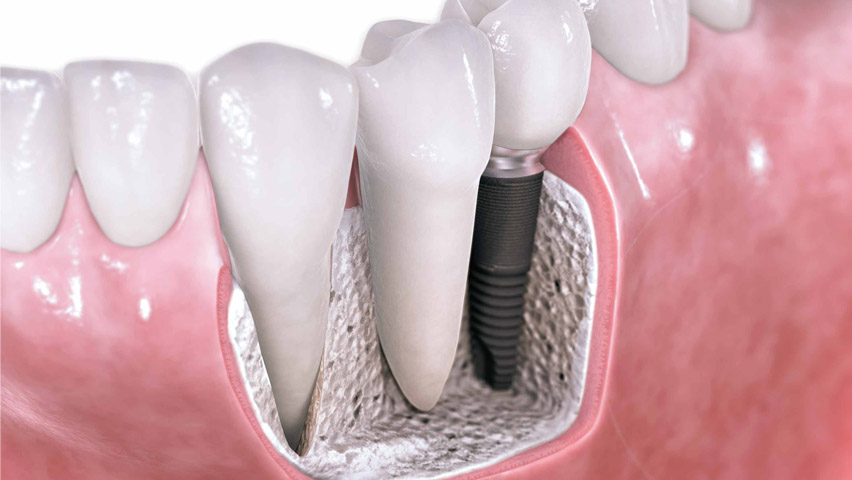A dental implant is used to support one or more false teeth. It is a titanium screw that can replace the root of a tooth when it fails. Just like a tooth root, it is placed into the jawbone.
Implants are a safe, well-established treatment. It’s probably true to say that implants, much like natural teeth, will last for as long as you care for them.
How well you look after your implants – and whether you go for your regular maintenance appointments – will have the biggest impact on how long they will last.
If you don’t look after your implants they will develop a coating similar to what you get on neglected natural teeth. Left untreated, this can lead to gum infection, bleeding, soreness and general discomfort. You could get all these problems with natural teeth.
Yes. You can have any number of teeth replaced with implants – from one single tooth to a complete set.
It depends on the condition of the bone in your jaw. Your dentist will arrange for a number of special tests to find out the amount of bone still there. If there is not enough, or if it isn’t healthy enough, it may not be possible to place implants without grafting bone into the area first.
Placing an implant is often easier than taking a tooth out and is usually done using a simple local anesthetic. You will not feel any pain at the time but, just like after an extraction, you may feel some discomfort during the week after the surgery. General anesthetics are rarely used for implants and are generally only used for very complicated cases.
Some false teeth can now even be fitted at the same time as the implants (these are called ‘immediate implants’). Check with your dental team to see whether these are suitable for you. Usually the false teeth are fitted 3 to 4 months after the implants are put in. Sometimes treatment takes longer and your dental team will be able to talk to you about your treatment time.
After your implants have been placed, the bone in your jaw needs to grow onto them and fuse to them. This usually takes a few months. Sometimes the implants may be stable enough when they are placed for the false teeth to be fitted sooner than this.
If you are having one, two or three teeth replaced, you may have a temporary denture in the meantime. If you already have full dentures, you can keep wearing these while your implants are healing. Your dentures will need altering, to fit properly after the surgery, and a ‘healing cap’ will usually be placed onto the implant site to protect it.
No. But aftercare is important if you are going to have a long-lasting, successful implant. Your dental team should give you detailed advice on how to look after your implants. Cleaning around the teeth attached to the implants is no more difficult than cleaning natural teeth. However, there may be areas that are difficult to reach and you’ll be shown how to clean them. You may need to visit your hygienist more often but your dental team will be able to talk to you about this.
Yes, if you don’t care for them well enough. If you keep them clean and have them regularly checked by your dental team you should not have any problems. Smoking also affects the health of implants. So, if you smoke, you may need to look after your implants more carefully. Some dentists will not place dental implants in people who are smokers.
If you have a single tooth missing, you will need an implant to support it. If you have a number of teeth missing, and these are next to each other, you could still have one implant for each tooth. Or you may find that, if you have two or more implants, they may be able to support more than one tooth each. Your dentist will talk to you about the best option for you
Implants and the teeth they support can be damaged by an accident in the same way that natural teeth can. So it is important that you wear a professionally made mouthguard if you play sports that involve contact or moving objects. If just the teeth are damaged, they can usually be removed from the implant and replaced.
However, if the titanium implant itself is damaged beyond repair, it can be safely left in the jaw if it is too difficult to remove. Another implant may be fitted alongside it to replace the damaged one.
This happens very rarely. If the implant becomes loose during the healing period, or just after, it is easily removed and your jaw will heal in the normal way. Once your jaw has healed, another implant can be placed there. Or the dentist can make a bridge, fitting it to the implanted false teeth that have been successful.

